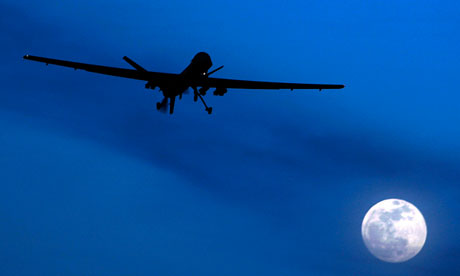Guardian
Owen Bowcott
Special rapporteur on counter-terror operations condemns Barack Obama's failure to establish effective monitoring process
 |
| Ben Emmerson QC called for effective investigations into US drone attacks. |
The United Nations is to set up a dedicated investigations unit in Geneva early next year to examine the legality of drone attacks in cases where civilians are killed in so-called "targeted" counter-terrorism operations.
The announcement was made by Ben Emmerson QC, a UN special rapporteur, in a speech to Harvard law school in which he condemned secret rendition and waterboarding as crimes under international law. His forthright comments, directed at both US presidential candidates, will be seen as an explicit challenge to the prevailing US ideology of the global war on terror.
Earlier this summer, Emmerson, who monitors counter-terrorism for the UN, called for effective investigations into drone attacks. Some US drone strikes in Pakistan may amount to war crimes, Emmerson warned.
In his Harvard speech, he said: "If the relevant states are not willing to establish effective independent monitoring mechanisms … then it may in the last resort be necessary for the UN to act.
"Together with my colleague Christof Heyns, [the UN special rapporteur on extra-judicial killings], I will be launching an investigation unit within the special procedures of the [UN] Human Rights Council to inquire into individual drone attacks."
The investigation unit will also look at "other forms of targeted killing conducted in counter-terrorism operations, in which it is alleged that civilian casualties have been inflicted". Emmerson maintained that the US stance that it can conduct counter-terrorism operations against al-Qaida or other groups anywhere in the world because it is deemed to be an international conflict was indefensible.
"The global war paradigm has done immense damage to a previously shared international consensus on the legal framework underlying both international human rights law and international humanitarian law," he said. "It has also given a spurious justification to a range of serious human rights and humanitarian law violations.
"The [global] war paradigm was always based on the flimsiest of reasoning, and was not supported even by close allies of the US. The first-term Obama administration initially retreated from this approach, but over the past 18 months it has begun to rear its head once again, in briefings by administration officials seeking to provide a legal justification for the drone programme of targeted killing in Pakistan, Yemen and Somalia …
"[It is] alleged that since President Obama took office at least 50 civilians were killed in follow-up strikes when they had gone to help victims and more than 20 civilians have also been attacked in deliberate strikes on funerals and mourners. Christof Heyns … has described such attacks, if they prove to have happened, as war crimes. I would endorse that view."
Emmerson singled out both President Obama and the Republican challenger Mitt Romney for criticism. "It is perhaps surprising that the position of the two candidates on this issue has not even featured during their presidential elections campaigns, and got no mention at all in Monday night's foreign policy debate.
"We now know that the two candidates are in agreement on the use of drones. But the issue of so-called enhanced interrogation techniques is an one which, according to the record, continues to divide them.
"I should make it absolutely clear that my mandate does not see to eye to eye with the Obama administration on a range of issues – not least the lack of transparency over the drone programme. But on this issue the president has been clear since he took office that water-boarding is torture that it is contrary to American values and that it would stop.
"... But Governor Romney has said that he does not believe that waterboarding is torture. He has said that he would allow enhanced interrogation techniques that go beyond those now permitted by the army field manual, and his security advisers have recommended that he rescind the existing restrictions."
The Cambodian dictator Pol Pot, he pointed out, used the technique. "Anyone who is in doubt about whether waterboarding is torture should visit Tuol Sleng, the infamous S-21 detention facility operated by the Khymer Rouge in Phnom Penh.
"Over a period of four years 14,000 people were systematically tortured and killed there. It is now a genocide museum. And right there, in the middle of the central torturing room, is the apparatus used by Pol Pot's security officials for waterboarding."































No comments:
Post a Comment